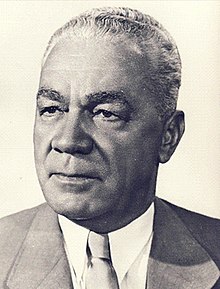Emil Bodnăraș
Emil Bodnăraş (born February 10, 1904 in Iaslovăț ; † January 24, 1976 in Bucharest ) was a Romanian politician, member of the Romanian Communist Party (RKP) and Romanian Defense Minister from 1947 to 1955 . In 1954 he was also deputy chairman of the State Council .
Life
Emil Bodnăraș was interested in the ideas of communism at an early age and emigrated to the USSR in 1932 . With this step, he ended his military training and officer career in the Romanian army .
Confronted with the real conditions in the Soviet Union , torn by civil war , he resigned himself and stayed in Germany , Switzerland and Czechoslovakia . When he returned to Romania in 1934, he was arrested and sentenced to ten years of forced labor. As a result, he was contacted by imprisoned cadres of the Romanian Communist Party and prepared for later entry into this party, which took place in 1940.
As a leading member of the group that organized the overthrow of the Romanian fascist government led by Ion Antonescu on April 23, 1944 , Bodnăraş gained influence and recognition among the party leaders of the RKP. After the end of the war, this paved the way for him to join the circle around Gheorghe Gheorghiu-Dej and to high party and government positions. From December 27, 1947 to October 3, 1955, Bodnăraş, who had not finished his military training, was Romanian Defense Minister. From 1954 to 1957 he was also elected deputy chairman of the State Council.
In the power struggle between Alexandru Drăghici and Nicolae Ceauşescu for the successor of Gheorghiu-Dej at the beginning of 1965, when Gheorghiu-Dej's death was foreseeable, he sided with the victorious Ceauşescu. Ceaușescu rewarded him by sending Bodnăraș to Moscow as the Romanian representative for the 20th anniversary of the victory of the Soviet Union in the " Great Patriotic War " in May 1965. This was the last time Bodnăraș performed on a larger scale. After that, Ceaușescu no longer allowed Bodnăraș to play a significant political role.
Honors
In communist Romania, Milișăuți and Bădeuți, together with the neighboring town of Iaslovăeten, formed a community that was named in 1976 after the functionary Emil Bodnăraș, who had died shortly before. After the Romanian Revolution in 1989 , it was renamed Milișăuți in 1996.
In his function as minister of a socialist brother state , he received the title Hero of the Soviet Union on a state visit to Moscow .
Individual evidence
- ↑ Miniştrii Apărării Naţionale , accessed on August 10, 2010.
- ^ Comisia Prezidenţială pentru Analiza Dictaturii Comuniste din România. Report final . Bucharest 2006, pp. 94-107.
- ^ Leonid Ilyich Brezhnev : The great victory of the Soviet people. Speech at the ceremony in the Moscow Kremlin on May 8, 1965 on the occasion of the 20th anniversary of the victory over Hitler's fascism . Dietz, Berlin 1965, p. 4.
- ^ Encyclopedia Bucharest (ed.): Taschenlexikon Romania . VEB Bibliographisches Institut Leipzig (German edition), Leipzig and Bucharest 1985, p. 42 .
Web links
| personal data | |
|---|---|
| SURNAME | Bodnăraș, Emil |
| BRIEF DESCRIPTION | Romanian politician and chief of staff |
| DATE OF BIRTH | February 10, 1904 |
| PLACE OF BIRTH | Iaslovăt |
| DATE OF DEATH | January 24, 1976 |
| Place of death | Bucharest |

